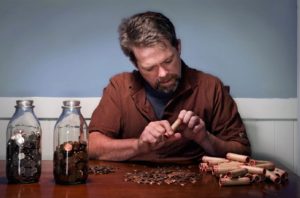Before we get into today’s show notes, a quick announcement that we’ve picked the dates for our next Your First Rental Property course enrollment!

Enrollment opens on Monday, April 12 at 8:01 am Eastern and closes on Monday, April 19 at 11:59 pm Pacific. 🥳
For more details, head here. If you’re interested in real estate investing but have no clue where to start, sign up to our VIP list for a free 7-day sneak peek at the course material.
Okay, let’s get to the show.

“What’s your FI number? What’s your FI date?”
People often talk about financial independence like it’s a fixed, static point. When your portfolio reaches $X value, or your monthly passive income is $Y per month, you’re FI.
“When did you reach FI?,” people will ask, as though it’s a one-way door with a distinct date, comparable to graduating from high school or college.
Today’s podcast guest, J.D. Roth, offers a fresh perspective: FI isn’t a fixed point. It’s a continuum, a spectrum.
He says there are seven stages along the road to financial independence, which include:
1: Dependence: This is what we experience when we’re five years old: total reliance on someone else.
This is also what we experience as adults if we depend on our credit cards for basics like groceries and utilities, and we can’t pay the balance in full at the end of the month.
2: Solvency: You can make your minimum payments, and you’re not adding new credit card debt to your monthly balance.
3: Stability: You’ve repaid your credit card debt. You have an emergency fund.
4: Agency: You have enough money that you can say “no” to certain money-making or money-saving opportunities if they’re toxic or unhealthy. You can’t stay unemployed forever, but you could get by for a couple of months. You have “FU” money — enough money to tell your boss “F*** you!!” if you needed to.
5: Security: There’s a HUGE gap between stage 4 and stage 5. Once you reach stage 5, you’re FI/FIRE — in this stage, you’re in a situation referred to as “Lean FIRE” or “Lean FI,” which means your investments are sufficient to pay for a basic standard of living. For example, your investments might be able to support the same living standard that you were raised with, or your living standards when you were in college or in your early 20’s.
6: Independence: Your investments can cover your current standard of living (at this momentary point in time.)
7: Abundance: You have more than enough and then some — you’re in a stage known as “Fat FIRE” or “Fat FI.”
In today’s interview, we elaborate on these seven stages. We also discuss seven rules for investing, how to calculate a lifetime wealth ratio, how to manage your career like it’s an asset, and much more.
Enjoy!!
Resources Mentioned:
- How to Achieve Financial Independence and Retire Early, by JD Roth | Audible Course
- GetRichSlowly.org | Website
- JDRoth.com | JD’s blog
Thanks to our sponsors!
Stereo
Stereo is a new, interactive platform where you can connect with your favorite podcast hosts in real-time. We’re on there! Every week, we’re hosting interviews, show recaps, Q&As, and highlighting financial news. Come join the fun – follow me at stereo.com/paulapant to receive a notification when I go live.
Gusto
Gusto makes payroll, benefits, and HR easy for modern small businesses. In fact, 72% of customers spend less than 5 minutes to run payroll! If you sign up at gusto.com/paula, you’ll receive 3 months free once you run your first payroll.
Grove.co
Grove makes shopping for natural products easy, and they make reducing dependence on single-use plastics easy, too. If you’re looking to reduce plastic waste while shopping for organic products at a good price, go to grove.co/affordanything to get a free Mrs. Meyer’s & Grove set + free shipping and VIP Trial!

My Betabrand pants are so comfortable!
Betabrand
It’s nice to feel comfortable and put together, especially when working from home. Betabrand has many different styles of dress pant yoga pants, and they’re as awesome as they sound. Check out betabrand.com/paula and get 30% off one pair.